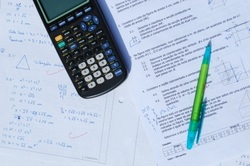
Of all the issues parents face during the college process, seemingly none are as confusing or as misrepresented as the PSAT. The goal of this post is to leave you completely lucid on the issue. Fortunately, the PSAT is simple to handle and negotiate. The four questions I'm always asked re: the PSAT are:
1. What's the point of the PSAT?
2. What's the difference between the PSAT and the SAT?3. How should my child prep for the PSAT?
4. When should my child start prepping for the PSAT?
Below, you'll find my answers to all four.
Q: What's the point of the PSAT?
A: To give you a kick in the pants (and, sometimes, to give you brownie points).
The PSAT doesn't play a factor in college admissions unless your child does well. Students who get great scores on the PSAT can be selected as National Merit Finalists - these students are coveted by colleges and can obtain scholarships and bonuses points that other students don't get. The number of NMFs at any college is a bragging point, and so colleges want as many as they can get. Please be aware that lack of NMF status does NOT stop your child from gaining admission, and real SAT scores are far more important. Becoming an NMF is just icing on the cake.
If you want your child to become an NMF, read on.
More important than the National Merit Scholarship, however, is the basic idea that the PSAT lets students know how they're going to do on the actual SAT. If you get a horrid score, it's time to prepare for the real deal. Colleges don't see bad PSAT scores, so you don't have to worry about bad scores hurting your child's chances. Bad scores on the PSAT do, however, indicate imminent bad scores on the SAT (as you'll learn in the next question). So while bad PSAT scores aren't damaging in and of themselves, they do indicate that you need to get your act together regarding the SAT.
Why are they so indicative? The next question should help:
Q: What's the difference between the SAT and the PSAT?
A: Practically nothing. The PSAT asks the exact same types of questions as the SAT, in the exact same format. There are only two actual differences:
1. The PSAT is about half as long as the SAT
2. The PSAT doesn't have an essay
Other than that, the two tests are exactly the same. While some claim that the questions on the PSAT are slightly easier than those on the SAT, that's a bit subjective. Overall, the difficulty level, material, etc. on both exams are practically identical. If you get a great PSAT score, you'll probably get a great SAT score - and vice versa.
However, even if the PSAT is a bit easier than the SAT, it makes no practical difference re: preparation techniques. Read on to find out why.
Q: How should my child prep for the PSAT?
A: The exact same way he or she should prep for the SAT.
Minus the essay, both tests are the same. If you want your child to get a great PSAT score, he/she should just prep for the SAT.
There are very few PSAT-prep resources, and to me, they've never made any sense. Why would you prep for something that's intentionally geared to be easier than what you're actually preparing to do? It's like training to run a 3K race when you're going to run a 5K a few months later. What the heck is the point? Just prep for the 5K to start - it's the same sport.
Every resource and technique that you'd use for the SAT is equally an viable (if not better) method for the PSAT. Just prep for the SAT.
With that in mind, the big final question:
Q: When should my child start prepping for the PSAT?
A: That depends - but probably as soon as possible.
I'm a big proponent of prepping for the SAT as soon as you possibly can. The longer-term your prep, the more prepared you'll be, plain and simple. Even a few vocab and math drills started during your child's freshman year can make a HUGE difference down the road.
If you're hellbent on getting your child NMF status, then I'd recommend prepping at least three months before the PSAT, just as I recommend starting prep at least three months before the SAT.
Again - if your child doesn't get great PSAT scores, it's not the end of the world. But if he/she gets great PSAT scores, then he/she is ready to sit down, take the SAT, and get it over with. So why not rip off the bandaid and get this whole process out of the way?
If you're looking for long-term prep strategies, you can always get in touch using my contact form - I'm always happy to help.
If you'd like to book me for your child's PSAT prep, please read my booking policies and, when you're ready, set up a booking appointment. Please keep in mind that my schedule is extremely tight, so the earlier you reserve my time, the better.
If you're looking for a good self-study program for the PSAT that you can complete on your own time (and that allows you to study on your own schedule and at your own pace and start early), you can always use my online SAT program to get started. Using my program is also an excellent foundation for working with me 1-on-1 later on, and I discount the purchase price from my own fees.
I hope this was helpful! Don't hesitate to get in touch if you have any questions using my contact form, and leave any comments below.
-Anthony
1. What's the point of the PSAT?
2. What's the difference between the PSAT and the SAT?3. How should my child prep for the PSAT?
4. When should my child start prepping for the PSAT?
Below, you'll find my answers to all four.
Q: What's the point of the PSAT?
A: To give you a kick in the pants (and, sometimes, to give you brownie points).
The PSAT doesn't play a factor in college admissions unless your child does well. Students who get great scores on the PSAT can be selected as National Merit Finalists - these students are coveted by colleges and can obtain scholarships and bonuses points that other students don't get. The number of NMFs at any college is a bragging point, and so colleges want as many as they can get. Please be aware that lack of NMF status does NOT stop your child from gaining admission, and real SAT scores are far more important. Becoming an NMF is just icing on the cake.
If you want your child to become an NMF, read on.
More important than the National Merit Scholarship, however, is the basic idea that the PSAT lets students know how they're going to do on the actual SAT. If you get a horrid score, it's time to prepare for the real deal. Colleges don't see bad PSAT scores, so you don't have to worry about bad scores hurting your child's chances. Bad scores on the PSAT do, however, indicate imminent bad scores on the SAT (as you'll learn in the next question). So while bad PSAT scores aren't damaging in and of themselves, they do indicate that you need to get your act together regarding the SAT.
Why are they so indicative? The next question should help:
Q: What's the difference between the SAT and the PSAT?
A: Practically nothing. The PSAT asks the exact same types of questions as the SAT, in the exact same format. There are only two actual differences:
1. The PSAT is about half as long as the SAT
2. The PSAT doesn't have an essay
Other than that, the two tests are exactly the same. While some claim that the questions on the PSAT are slightly easier than those on the SAT, that's a bit subjective. Overall, the difficulty level, material, etc. on both exams are practically identical. If you get a great PSAT score, you'll probably get a great SAT score - and vice versa.
However, even if the PSAT is a bit easier than the SAT, it makes no practical difference re: preparation techniques. Read on to find out why.
Q: How should my child prep for the PSAT?
A: The exact same way he or she should prep for the SAT.
Minus the essay, both tests are the same. If you want your child to get a great PSAT score, he/she should just prep for the SAT.
There are very few PSAT-prep resources, and to me, they've never made any sense. Why would you prep for something that's intentionally geared to be easier than what you're actually preparing to do? It's like training to run a 3K race when you're going to run a 5K a few months later. What the heck is the point? Just prep for the 5K to start - it's the same sport.
Every resource and technique that you'd use for the SAT is equally an viable (if not better) method for the PSAT. Just prep for the SAT.
With that in mind, the big final question:
Q: When should my child start prepping for the PSAT?
A: That depends - but probably as soon as possible.
I'm a big proponent of prepping for the SAT as soon as you possibly can. The longer-term your prep, the more prepared you'll be, plain and simple. Even a few vocab and math drills started during your child's freshman year can make a HUGE difference down the road.
If you're hellbent on getting your child NMF status, then I'd recommend prepping at least three months before the PSAT, just as I recommend starting prep at least three months before the SAT.
Again - if your child doesn't get great PSAT scores, it's not the end of the world. But if he/she gets great PSAT scores, then he/she is ready to sit down, take the SAT, and get it over with. So why not rip off the bandaid and get this whole process out of the way?
If you're looking for long-term prep strategies, you can always get in touch using my contact form - I'm always happy to help.
If you'd like to book me for your child's PSAT prep, please read my booking policies and, when you're ready, set up a booking appointment. Please keep in mind that my schedule is extremely tight, so the earlier you reserve my time, the better.
If you're looking for a good self-study program for the PSAT that you can complete on your own time (and that allows you to study on your own schedule and at your own pace and start early), you can always use my online SAT program to get started. Using my program is also an excellent foundation for working with me 1-on-1 later on, and I discount the purchase price from my own fees.
I hope this was helpful! Don't hesitate to get in touch if you have any questions using my contact form, and leave any comments below.
-Anthony



 RSS Feed
RSS Feed